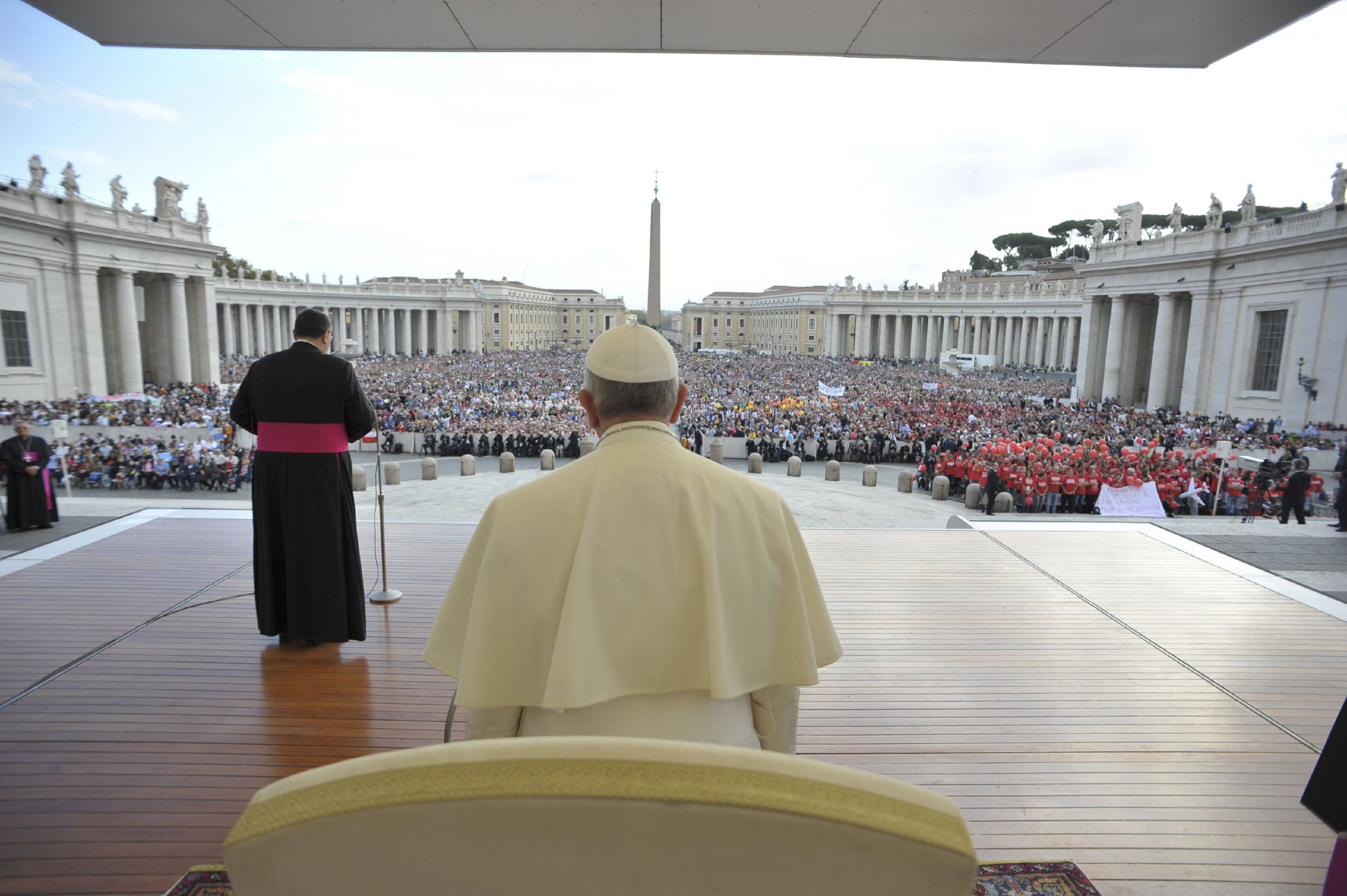
Pope Francis has been head of the Catholic Church for less than two years, but in that time he has managed to overshadow his predecessor, Pope Benedict XVI, with his progressive statements on issues ranging from gay marriage to capitalism. On Monday, he did it again, saying evolutionary theory does not contradict biblical teaching—at an unveiling of a bust of Benedict.
This time, however, his remarks may not have been that revolutionary for Roman Catholics across the world.
Pope Francis told an audience from the Pontifical Academy of Sciences in Vatican City on Monday that theories of evolution and the Big Bang are not inconsistent with creationism and biblical teaching. "The evolution in nature is not opposed to the notion of Creation, because evolution presupposes the creation of beings that evolve," Pope Francis said, according to a Vatican newswire transcript of the event.
"When we read in Genesis the account of Creation, we risk imagining that God was a magician, with such a magic wand as to be able to do everything," he said. "However, it was not like that. He created beings and left them to develop according to the internal laws that He gave each one, so that they would develop, and reach their fullness."
The creation of the universe, Francis said, was not a singular event, but rather "went forward for centuries and centuries, millennia and millennia until it became what we know today."
To some, Francis's remarks could be seen as a departure from the position of his predecessor, Pope Benedict, who, before resigning the papacy in 2013 was known for his consistent orthodoxy on issues ranging from birth control, to abortion, to homosexuality. In a speech delivered the day before he was elected pope, Cardinal Joseph Ratzinger, as Benedict was then known, described moral relativism—the idea that "right" and "wrong" may change according to circumstances—a "dictatorship...that does not recognize anything as definitive and whose ultimate goal consists solely of one's own ego and desires."
But before he became pope, Ratzinger delivered an address at the Vatican in 2002 in which he stated that "converging evidence from many studies in the physical and biological sciences furnishes mounting support for some theory of evolution to account for the development and diversification of life on Earth."
While the church may be out of step with society on some issues, evolution is not one of them. In 1950, the church haltingly dipped its toe into the water when Pope Pius XII, in an letter to bishops titled Humani Generis, wrote, "[The] Church does not forbid...research and discussions...take place with regard to the doctrine of evolution, in as far as it inquires into the origin of the human body as coming from pre-existent and living matter…" It was fine for Catholics to think about and debate about evolution, as long as they kept the soul out of it, the document implied. The soul, Pius said, was injected into human beings by God, and could not arise from natural processes.
Almost half a century later, in a 1996 letter to bishops, Pope John Paul II came out more strongly for Darwin's theory, calling evolution "more than a hypothesis." On the subject of the soul, however, John Paul agreed with Pius. The soul, John Paul agreed, could not emerge "from the forces of living matter, or as a mere epiphenomenon of this matter."
In light of these previous statements, Pope Francis's position is "hardly news within the Roman Catholic community," Kenneth Miller, a professor of biology at Brown University said in an email to Newsweek. Miller, a Roman Catholic, has written two books arguing against the teaching of creationism or intelligent design in schools, and arguing for the compatibility of evolution and Catholic theology.
"[Francis's] views echo those of his predecessors, including Pope Benedict XVI and especially John Paul II on the importance of respecting the independence and integrity of scientific inquiry," Miller said.
Where Francis departs from his predecessor Benedict, is that he appears not merely to tolerate the existence of the theory of evolution, but to celebrate it, John F. Haught, a Roman Catholic theologian and professor of theology at Georgetown University tells Newsweek.
Francis views the universe as a continuously unfolding drama, Haught says, and thinks a God who "makes things that make themselves"—as fellow Jesuit Pierre Teilhard de Chardin espoused—is an infinitely more interesting deity than one who must continually tinker with his creations to get them right, Haught says.
For Haught, Francis separates himself from his predecessors in the church's leadership with a "fundamental openness of his mind and spirit."
Uncommon Knowledge
Newsweek is committed to challenging conventional wisdom and finding connections in the search for common ground.
Newsweek is committed to challenging conventional wisdom and finding connections in the search for common ground.
About the writer
Taylor is a general assignment reporter for Newsweek where he writes about U.S. politics, crime and courts, religion, marijuana law, ... Read more
To read how Newsweek uses AI as a newsroom tool, Click here.








